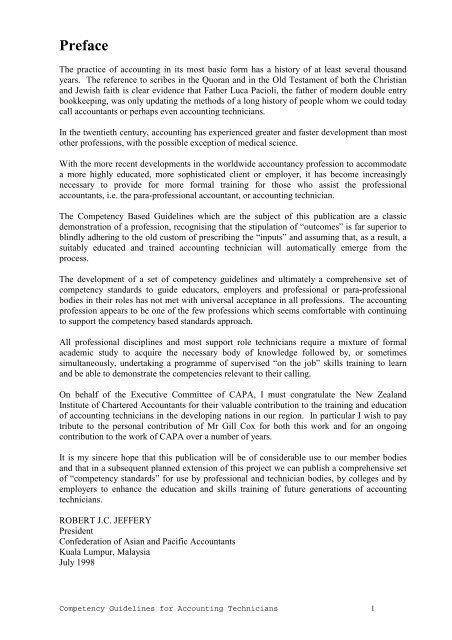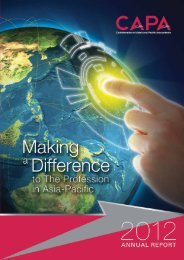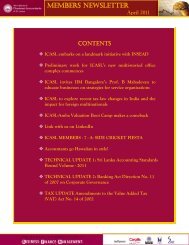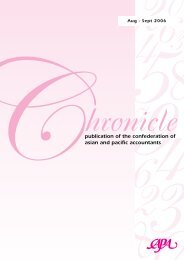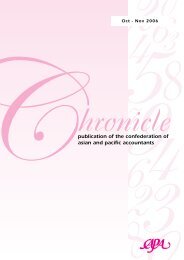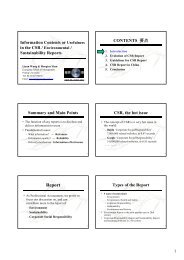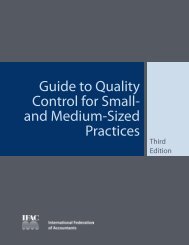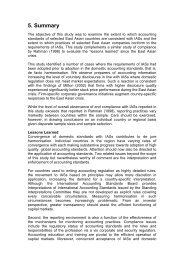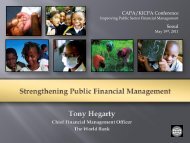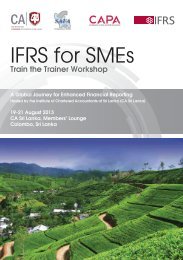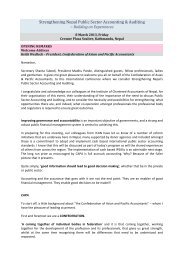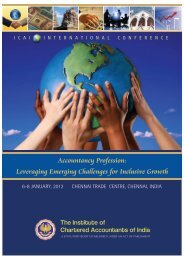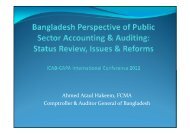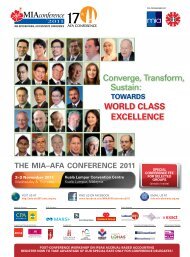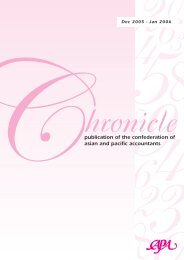Preface - Confederation of Asian and Pacific Accountants
Preface - Confederation of Asian and Pacific Accountants
Preface - Confederation of Asian and Pacific Accountants
You also want an ePaper? Increase the reach of your titles
YUMPU automatically turns print PDFs into web optimized ePapers that Google loves.
<strong>Preface</strong><br />
The practice <strong>of</strong> accounting in its most basic form has a history <strong>of</strong> at least several thous<strong>and</strong><br />
years. The reference to scribes in the Quoran <strong>and</strong> in the Old Testament <strong>of</strong> both the Christian<br />
<strong>and</strong> Jewish faith is clear evidence that Father Luca Pacioli, the father <strong>of</strong> modern double entry<br />
bookkeeping, was only updating the methods <strong>of</strong> a long history <strong>of</strong> people whom we could today<br />
call accountants or perhaps even accounting technicians.<br />
In the twentieth century, accounting has experienced greater <strong>and</strong> faster development than most<br />
other pr<strong>of</strong>essions, with the possible exception <strong>of</strong> medical science.<br />
With the more recent developments in the worldwide accountancy pr<strong>of</strong>ession to accommodate<br />
a more highly educated, more sophisticated client or employer, it has become increasingly<br />
necessary to provide for more formal training for those who assist the pr<strong>of</strong>essional<br />
accountants, i.e. the para-pr<strong>of</strong>essional accountant, or accounting technician.<br />
The Competency Based Guidelines which are the subject <strong>of</strong> this publication are a classic<br />
demonstration <strong>of</strong> a pr<strong>of</strong>ession, recognising that the stipulation <strong>of</strong> “outcomes” is far superior to<br />
blindly adhering to the old custom <strong>of</strong> prescribing the “inputs” <strong>and</strong> assuming that, as a result, a<br />
suitably educated <strong>and</strong> trained accounting technician will automatically emerge from the<br />
process.<br />
The development <strong>of</strong> a set <strong>of</strong> competency guidelines <strong>and</strong> ultimately a comprehensive set <strong>of</strong><br />
competency st<strong>and</strong>ards to guide educators, employers <strong>and</strong> pr<strong>of</strong>essional or para-pr<strong>of</strong>essional<br />
bodies in their roles has not met with universal acceptance in all pr<strong>of</strong>essions. The accounting<br />
pr<strong>of</strong>ession appears to be one <strong>of</strong> the few pr<strong>of</strong>essions which seems comfortable with continuing<br />
to support the competency based st<strong>and</strong>ards approach.<br />
All pr<strong>of</strong>essional disciplines <strong>and</strong> most support role technicians require a mixture <strong>of</strong> formal<br />
academic study to acquire the necessary body <strong>of</strong> knowledge followed by, or sometimes<br />
simultaneously, undertaking a programme <strong>of</strong> supervised “on the job” skills training to learn<br />
<strong>and</strong> be able to demonstrate the competencies relevant to their calling.<br />
On behalf <strong>of</strong> the Executive Committee <strong>of</strong> CAPA, I must congratulate the New Zeal<strong>and</strong><br />
Institute <strong>of</strong> Chartered <strong>Accountants</strong> for their valuable contribution to the training <strong>and</strong> education<br />
<strong>of</strong> accounting technicians in the developing nations in our region. In particular I wish to pay<br />
tribute to the personal contribution <strong>of</strong> Mr Gill Cox for both this work <strong>and</strong> for an ongoing<br />
contribution to the work <strong>of</strong> CAPA over a number <strong>of</strong> years.<br />
It is my sincere hope that this publication will be <strong>of</strong> considerable use to our member bodies<br />
<strong>and</strong> that in a subsequent planned extension <strong>of</strong> this project we can publish a comprehensive set<br />
<strong>of</strong> “competency st<strong>and</strong>ards” for use by pr<strong>of</strong>essional <strong>and</strong> technician bodies, by colleges <strong>and</strong> by<br />
employers to enhance the education <strong>and</strong> skills training <strong>of</strong> future generations <strong>of</strong> accounting<br />
technicians.<br />
ROBERT J.C. JEFFERY<br />
President<br />
<strong>Confederation</strong> <strong>of</strong> <strong>Asian</strong> <strong>and</strong> <strong>Pacific</strong> <strong>Accountants</strong><br />
Kuala Lumpur, Malaysia<br />
July 1998<br />
Competency Guidelines for Accounting Technicians 1
Overview<br />
The syllabus is intended (in the preparer’s words) to provide “a high level syllabus for the<br />
education <strong>and</strong> training <strong>of</strong> Accounting Technicians”. It is anticipated that CAPA members (<strong>and</strong><br />
others) could use the syllabus as a guide to developing their own more detailed prescriptions.<br />
The competency guidelines should assist in encouraging a higher level <strong>of</strong> consistency in<br />
education <strong>and</strong> training at this level. The author stressed the need for the guidelines to be useful<br />
to a wide range <strong>of</strong> possible users. While the report does not address the issue <strong>of</strong> assessing<br />
whether an individual has achieved a particular competency, it does provide some guidance on<br />
where the achievement <strong>of</strong> competencies is undertaken (workplace or class room).<br />
Note that the consultant has indicated that many <strong>of</strong> the competencies relating to specific<br />
applications <strong>of</strong> accounting knowledge <strong>and</strong> selected business related knowledge areas such as<br />
Tax, financial management <strong>and</strong> computing could be achieved within the workplace. This will<br />
have implications for measuring (confirming achievement) such competencies <strong>and</strong><br />
documenting achievement within the workplace. Supervising staff will need to be adequately<br />
prepared for this role.<br />
The consultant acknowledged the difficulty in identifying general pre-requisite knowledge<br />
requirements for entry into an Accounting Technicians course. Clearly these requirements will<br />
vary from country to country <strong>and</strong> will reflect general education systems <strong>and</strong> the needs <strong>of</strong> the<br />
likely major employment areas for Accounting Technicians.<br />
The guidelines address both accounting <strong>and</strong> general business knowledge areas <strong>and</strong> are<br />
structured into five areas:<br />
1. Introductory.<br />
2. The Environment <strong>of</strong> Business.<br />
3. The Accounting Process.<br />
4. Specific Applications <strong>of</strong> Accounting Knowledge.<br />
5. Business Related Knowledge.<br />
The consultant recommends that the first four areas should be attempted sequentially, with<br />
Business Related Knowledge aspects being considered at various times, depending on the<br />
requirement for judgement <strong>and</strong>/or particular accounting skills. Generic competencies relating<br />
to communications are included, with achievement within the workplace being suggested as<br />
appropriate.<br />
The required levels <strong>of</strong> competency are identified at three levels:<br />
• Level 1 (Awareness).<br />
• Level 2 (Knowledge).<br />
• Level 3 (Skill).<br />
Each level builds on competencies developed at lower levels.<br />
Specific Comments<br />
The emphasis on underst<strong>and</strong>ing small business operations in the Introductory area is<br />
particularly appropriate for Accounting Technicians in developing countries where such<br />
enterprises are likely to represent a significant proportion <strong>of</strong> economic activity. This<br />
importance is also reflected in the emphasis (in The Environment <strong>of</strong> Business) on<br />
underst<strong>and</strong>ing the legal <strong>and</strong> economic environment within which businesses operate.<br />
Competency Guidelines for Accounting Technicians 2
The inclusion <strong>of</strong> competency in underst<strong>and</strong>ing the ethical requirements <strong>of</strong> business <strong>and</strong><br />
pr<strong>of</strong>essional activity is appropriate. However, I would have considered that specific elements<br />
relating to the relevant pr<strong>of</strong>essional accounting body would have been linked to membership<br />
<strong>of</strong> that body. If the education program is to be <strong>of</strong>fered through post-secondary school<br />
educational institutions, it may not be appropriate to include that specific element.<br />
In developing countries, there may be resource constraints which limit the achievement <strong>of</strong><br />
level 3 competency (skill) in the application <strong>of</strong> accounting s<strong>of</strong>tware packages. This may also<br />
limit the development <strong>of</strong> competencies in the use <strong>of</strong> generic s<strong>of</strong>tware packages such as word<br />
processing, spreadsheets, databases <strong>and</strong> accounting information systems.<br />
In general, the specific areas <strong>of</strong> accounting knowledge, business related knowledge <strong>and</strong><br />
business environment are very similar to those areas in TAFE Accounting (Diploma) courses<br />
in Australia.<br />
JAN CHAMBERLAIN<br />
National Education Manager<br />
Australian Society <strong>of</strong> Certified Practising <strong>Accountants</strong><br />
Melbourne, Australia<br />
29 May 1998<br />
Competency Guidelines for Accounting Technicians 3
Foreword<br />
Recent history has seen massive change in ideology in many countries.<br />
Recent history has seen the rapid <strong>and</strong> sustained development <strong>of</strong> many economies that have<br />
previously been described as “undeveloped”.<br />
Recent history has seen the emergence <strong>of</strong> information technology as a principal driver <strong>of</strong><br />
organisations whether they be “for pr<strong>of</strong>it” or “not for pr<strong>of</strong>it”.<br />
The accounting pr<strong>of</strong>ession has had, <strong>and</strong> continues to have, a major role in these changes.<br />
An important part <strong>of</strong> the pr<strong>of</strong>ession’s own development has been the encouragement that it has<br />
provided to those who have education <strong>and</strong> training to accounting technician or “middle level”.<br />
Both developing economies <strong>and</strong> those that have already reach the “developed” stage can<br />
benefit greatly by the recognition <strong>and</strong> growth <strong>of</strong> accounting technicians. The first group<br />
because <strong>of</strong> the need to provide emerging industry with basic financial management support;<br />
the second group because <strong>of</strong> the cost effectiveness that accounting technicians provide in the<br />
operation <strong>of</strong> financial management systems, <strong>and</strong> the performance <strong>of</strong> accounting functions<br />
specified <strong>and</strong> controlled by accounting pr<strong>of</strong>essionals qualified to a higher level.<br />
The <strong>Confederation</strong> <strong>of</strong> <strong>Asian</strong> <strong>and</strong> <strong>Pacific</strong> <strong>Accountants</strong> (CAPA) has recognised the need, <strong>and</strong> the<br />
value that can be achieved from the development <strong>of</strong> the accounting technician group. The<br />
International Federation <strong>of</strong> <strong>Accountants</strong> has also recognised the need <strong>and</strong> value <strong>of</strong> this group<br />
as is evidenced in its recent <strong>and</strong> ongoing work.<br />
The competency guidelines produced by CAPA are intended to provide a framework for use<br />
by various countries/accounting bodies in establishing the educational base for accounting<br />
technicians. They are intended therefore to be flexible <strong>and</strong> to be interpreted according to the<br />
environment in which a particular education initiative is being undertaken. To this extent they<br />
do not prescribe the specific education <strong>and</strong> training model to be used.<br />
It is important for users to recognise that knowledge is but one <strong>of</strong> three requirements for entry<br />
to a pr<strong>of</strong>ession – the others being workplace experience, <strong>and</strong> development <strong>of</strong> pr<strong>of</strong>essional<br />
awareness <strong>and</strong> underst<strong>and</strong>ing. These latter two areas are not specifically addressed in these<br />
guidelines although inevitably there are clear linkages to these requirements.<br />
The Guidelines produced focus on the “what” in terms <strong>of</strong> a framework – a separate issue is the<br />
“how”. This relates to the manner in which the competencies set out in the framework are<br />
both developed <strong>and</strong> assessed. This will vary between countries/pr<strong>of</strong>essional bodies according<br />
to their education philosophy, culture, experience etc.<br />
As a foundation step the Guidelines produced by CAPA are commended to any<br />
country/pr<strong>of</strong>essional body embarking on the initial design, or review, <strong>of</strong> the knowledge<br />
requirements for Accounting Technicians or “middle level” accountants.<br />
W. GILL COX<br />
The Institute <strong>of</strong> Chartered <strong>Accountants</strong> <strong>of</strong> New Zeal<strong>and</strong><br />
Christchurch, New Zeal<strong>and</strong><br />
3 June 1998<br />
Competency Guidelines for Accounting Technicians 4


